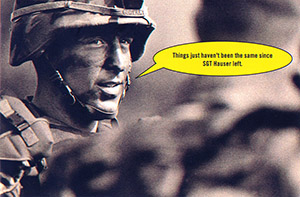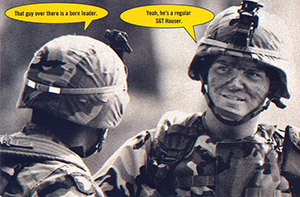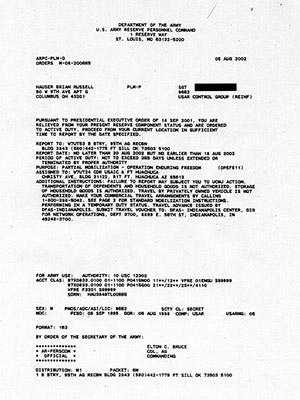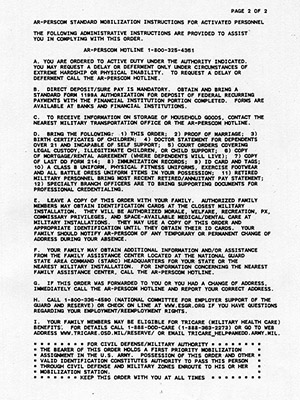From "Thank You for Your Support"
by Brian Russell Hauser
This excerpt from the first chapter of a memoir-in-progress is an attempt to capture my thoughts and emotions at the moment I realized I was being called to war. I left the U.S. Army to attend graduate school in 1999, only to be involuntarily called back into active military service one year into the “war on terror.” Instead of painting a static picture of what I must have felt like when I received the news, I use my mobilization orders (the document itself) as the focus of a sort of running rhetorical critique that allows those thoughts and feelings to manifest in time. You’ll find every stage of grief (Denial, Anger, Bargaining, Depression, and Acceptance) in this excerpt, each one liberally coated in the tertiary A of Absurdity.
What is the voice of the U.S. Army? Is it the bark of a drill sergeant? Is it the down-home common sense of a combat general? Is it the gung-ho shouts of “hooah” from soldiers? The Army has many voices, of course, but most Americans encounter a very limited number of them. I believe the Army has at least two public voices, one for recruiting and the other for conveying information deemed important to civil-military relations (e.g., news conferences, promotion and award ceremonies, funerals, etc.). The civil-military voice is tremendously disciplined but often quite boring. Its only flashes of inspiration come from those wizened combat generals testifying before Congress in moments of professional honesty far too rare. The recruiting voice, on the other hand, the marketing voice, is sophisticated, multifarious, and highly effective, as evidenced by the government’s ability to maintain an all-volunteer force of such size and power for three decades. Anyone who watches television is doubtless familiar with years’ worth of Army marketing, from “Army Strong” to “Army of One” all the way back to “Be All You Can Be.” But of course, television marketing is only one piece of the pie; the Army saturates the public sphere with web-based, radio-based, and visual ads, not to mention the physical presence of uniformed recruiters in high-traffic locales like big box stores, malls, secondary schools, and college campuses. Americans hear the Army’s institutional voices, the ones reserved for its own soldiers and for the soldiers and civilians of other countries, far less often. We might be tempted to include the recent surge of blogs by Army soldiers as well as the long history of memoirs by veterans among the Army's public voices, but these voices (including the one you are reading right now) do not speak for the U.S. Army; they speak about it.These voices encompass the imperative voice of military orders, the pedagogical voice of military training, and the persuasive voice of psychological operations (PsyOps). These are the voices that the Army uses in the execution of its missions.
As a veteran of the U.S. Army, I have been privy to all of these voices at various times. Growing up, I heard the recruiting voice on television, which no doubt was part of the reason I eventually enlisted as a soldier in military intelligence. During my four years of active duty, I heard a lot of the imperative and training voices and, since I worked in military intelligence, I knew a bit about the voice used in psychological operations as well. I separated from the Army in 1999 and began graduate school in American literature, so from that point on I was back to hearing only the recruiting voice (albeit with a very different ear) with the additional register of occasional direct attempts to convince me to return to active duty.
The day my narrative theory seminar finished with Lolita and looked ahead to J.M. Coetzee’s Waiting for the Barbarians, just two weeks before the completion of my doctoral course work, the Army ordered me back to active duty. The government envelope was the only item in my mailbox that day when I returned to my tiny apartment. It was a twelve-by-nine manila envelope with a clear plastic window beneath the return address for the U.S. Army Reserve Personnel Command (AR-PERSCOM) in St. Louis. The Army’s attempts to get me to re-enlist always came up short, and at first I thought the packet in my mailbox was just one more. However, the re-enlistment flyers I had received up to this point were normally nothing more than foldout postcards offering a free t-shirt or tote bag if I contacted a recruiter to discuss my options for returning to service. Within two years, after high casualties from the war in Iraq had seriously eroded recruitment numbers, these postcards would become much savvier.
This envelope was not like the other attempts by the Army to get me to re-enlist. This packet was thick, and that’s what drew my attention to the plastic window:
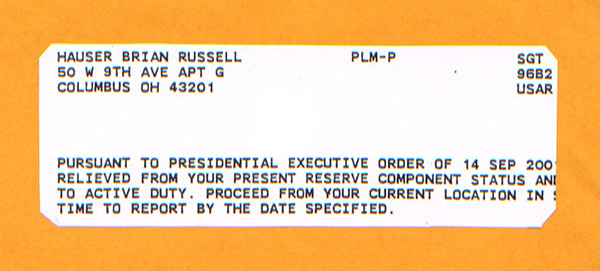
Figure 3: Envelope
“Fuck! Fuckfuckfuckfuckfuck.”
My stomach felt the same way it did the first and only time I jumped from an airplane. It didn’t flutter; it dropped with such rapidity that I felt weightless. The exhilarating thing about skydiving is that you feel buoyed by air resistance. There was no exhilaration here, no air. I needed to know more, but it was too sweltering outside, even in the shade. I stumbled into my apartment, dropped the packet on top of Waiting for the Barbarians and sat on the loveseat without dropping my book bag.
“Fuck.”
With a deep breath, I took out my pocketknife and slit open the top of the envelope. The very top page, the one partially visible through the clear plastic window, was the order calling me back to active duty. It was dated Aug. 5, 2002. The full text of the paragraph I glimpsed through the plastic window read like this:

Figure 4: Relief
Only in the narrowest sense could I be said to have been relieved from my current reserve component status. In truth, there was nothing about this that inspired relief. One can be relieved of duty, and in the leisure-loving ways of America, we understand that one has then been relieved of the burden of having to work, at least temporarily. That is not what this paragraph meant. What this meant was that the Department of the Army found it in its heart to relieve me of the burden of living in my own apartment in relative safety, going to bed and waking up when I pleased, studying for a doctorate in early-American literature, and teaching students the nuances of expository writing. The piece of paper I held in my hand relieved me of all this. I was relieved. What a relief.
This isn't who I am anymore, I kept thinking, but the very military font, shouting at me in black and white and in all caps, begged to differ. Its story was that I had signed a contract in May of 1995. In that contract I agreed to serve four years on active duty and then an additional four years in the Individual Ready Reserve (IRR), the “reserve component status” referred to in that paragraph. I had served my four years in the regular Army, but only a little over three years of my IRR commitment. The legal fact was that I had never left the Army at all; I had merely been “transitioned” from one component to another. On the other hand, the IRR is not like the Selective Reserve, which is what most people think of when they think of the reserves. In the Selective Reserve, you are assigned to a Reserve unit, you have a commanding officer and supervisors, you get into your uniform and go to drill one weekend a month, and then you go away for some kind of training duty for two weeks every year. In the IRR, you do none of this. You can grow your hair long, shitcan your uniforms, and get fat and lazy. The only time the IRR is called to duty is during periods of national crisis; it’s like a fire extinguisher case you see in the hallway: “Break Glass in Case of War.”In the mid-1990s, people who enlisted in the Army knew that they could be called back to the Army during their period of IRR commitment, but it was widely believed that no one would be. No one I knew predicted war on the horizon. But when the second plane hit the towers, it was clear we had entered one of those periods of national crisis; as of Sept. 11, 2001, I knew that this letter might come someday.
Below that paragraph, there was more information. I had been assigned to the United States Army Intelligence Center at Fort Huachuca, Arizona. When I enlisted in the Army in 1995, I trained as an All-Source Intelligence Analyst; since Huachuca is where the Army's intelligence personnel are trained, it probably meant that I would be going there for some kind of refresher course before being assigned to my actual duty station. I was going back to Intelligence School, where the Army teaches you to produce intelligence. Who couldn’t use a little bit more intelligence? I mean, really. But first, I was assigned to the 95th Adjutant General Reception Battalion at Fort Sill, Oklahoma. A reception battalion has the mission of assimilating real human beings into the massive institutional bureaucracy of the military. Enlistees begin filling out reams of paperwork that begin the conversion of the individual into a series of codes and classifications. In addition to paperwork, inoculations, and basic medical exams, enlistees are also introduced to the rudiments of military culture and unit cohesion, though in a relatively laid-back fashion compared to basic training. Soldiers live in large bays with bunks and communal bathrooms, they march from one place to another in groups, and they begin to learn the proper forms of address. (N.B. In effect, “Yes, Drill Sergeant” is the only acceptable form of military address in a reception battalion.) On the other hand, reception drill sergeants are normally not allowed to utilize the more intense forms of callisthenic behavior modification common in basic training. No one was getting dropped for 50 push-ups in reception, and no one was being ordered on a ten-mile run or a twenty-mile forced march. I was to report to the reception battalion at Fort Sill no later the Aug. 20 and no earlier than Aug. 18. My period of active duty was not to exceed 365 days unless extended or terminated by proper authority. Under normal circumstances, an extension is a good thing, like an extended warranty or an extended run in theater. Similarly, termination sounds bad. These, of course, were not normal circumstances. We would come to fear extensions and to crave termination.
In the middle of the front page was a line that read, "PURPOSE: PARTIAL MOBILIZATION - OPERATION ENDURING FREEDOM." For a moment, I read "partial" in reference to my own mobilization. Maybe this isn't so bad after all, I thought; maybe I’m not really going away. But I knew that partial mobilization simply referred to how much of the reserve force is being called up for a given crisis. A full mobilization is just that: Everybody comes to the party. Partial mobilization is the practice of calling up individual reservists who possess skills deemed to be in short supply by the commanders in the field, and it had been a truism during the 1990s that Military Intelligence personnel were always in short supply. As a rule, military intelligence personnel test far higher on the Armed Services Vocational Aptitude Battery (ASVAB) than other soldiers. The minimum scores necessary to qualify for intelligence jobs consistently outpace those necessary for all but the most technical jobs in the Army. The ASVAB is designed so that someone with a 9th grade education can pass it, but to get the scores necessary to become an intelligence professional, a soldier basically needs to be college-ready. It is no surprise, then, that many who enlist into military intelligence do so as only a temporary stop on the way to college and a different career entirely. Tens of thousands of enlistees, regardless of their original intentions, eventually come to think of the Army as home or at least as their single-career employer; the benefits are simply too good compared to the wider market. M.I. soldiers are usually paying for college and/or building their résumé, leading to a perennial dearth of military intelligence soldiers. I didn’t enlist to pay for college, but I did leave the Army for graduate school.
Well, this isn't going to work. The 20th is no good for me. That's a week before the end of the quarter. I have to read Waiting for the Barbarians and then write a seminar paper. I have an annotated bibliography on law and literature to finish for my advisor. I have twenty freshmen that expect me to finish the quarter with them. Maybe in a couple years, when I am deep into the grim writer's block of my dissertation and I have exhausted all normal means of procrastination. Maybe then, but not now. Not this. I don't have time to go to war.
The rest of the information on the front of the sheet was both disturbing and confusing:

Figure 7: Instructions
The UCMJ is the Uniformed Code of Military Justice, the legal code to which all uniformed service personnel are subject. The UCMJ is in many ways separate from the civilian criminal code, though it is enacted and regulated by Congress. But just what did they mean by failure to report may subject me to UCMJ action? Was this a dare? If you don’t show up, we might be forced to prosecute you as a deserter, which in a time of war is occasionally punishable by death. But we’re not sure if we feel like subjecting you to UCMJ action, even if you fail to report. If I were you, I would show up, but it’s totally up to you.
The rest of the paragraph was no better. I am not authorized to transport either my dependents or my household goods, but I am authorized to store my household goods? Should I merely take it as read that I am authorized to store my dependents? And I am not allowed to travel in a privately-owned vehicle? Travel where? Anywhere? Does this mean I can’t even get into a car? And don’t even get me started on the cultural significance of the fact that the military’s abbreviation “POV” refers to an automobile instead of a point of view. It is the final line of the paragraph that most amuses me. “Performing in a temporary duty status.” I think I saw that on an Army Reserve poster in Atlantic City once: Live! For 365 Nights Only (unless extended or terminated)!Performing in a Temporary Duty Status!It’s a year for chrissakes, a year during a war; how temporary is that?
On the back of the sheet was a list of instructions separated into lettered paragraphs and an 800 number for the AR-PERSCOM Hotline, which claimed to be the one resource for answering all of my questions. Paragraph A read:

Figure 8: Options
I had to admit that neither of those criteria seemed to apply to me. One might reasonably assert that being called to war is a hardship, but from the perspective of a soldier it is hardly extreme. From the Army’s perspective, extreme hardship is something like being a single parent with multiple special-needs children; leaving would do more harm than good. I was a single, childless graduate student. Certainly it was going to be a nuisance to my students and the English Department if I left prior to the end of the academic term, but someone could be found to teach the last two weeks of my class. Institutionally, I was replaceable. As for physical inability, I was twenty pounds heavier after three years of little to no exercise, but my body was more or less sound; I was still relatively young, resilient, and able. I could be pounded into shape if need be, but did they really need me?
In another paragraph, I was told to bring the following:

Figure 9: Documents
Only about half of these things applied to me at all. I had the orders, my DD 214 (a Certificate of Release or Discharge from Active Duty, containing valuable information about awards, qualifications, and the time remaining on a person's service obligation), a set or two of dog tags, and enough uniform items to get by on. I could get a rental agreement from my landlord; I would have to, since I needed a place to keep all my stuff, and I would eventually need a place to come home to. But I drew a blank at the immunization records. The unit I was in during my active service sent its soldiers all over the world, and prior to any deployment, we all had to make sure our shots were up to date. A lot of soldiers cling to their shot records like life itself, because losing it means they must get every shot listed for their place of duty, just to be safe. This can mean a battery of a dozen shots. If you're lucky, you get an equal number of shots in each arm, and for a couple of days, you feel like you have the shoulders of Mr. Universe. I don't mind shots particularly, but even so I wasn't relishing the prospect of having this kind of immuno-soup sloshing around in my veins all at once. Did I still have that yellow shot record somewhere?
What I didn’t know until later was that this whole mobilization was a complete come-as-you-are operation. The truth was I didn’t need to bring any of that stuff, with the possible exception of my orders and a piece of photo identification. I could have shown up to Fort Sill naked, with my driver’s license in one hand and my orders in the other, and I would have been just as well off as I was arriving fully clothed with my duffle bag full of random uniform items, spiral notebooks, and a mass-market copy of Moby Dick. In fact, the Army was better prepared to issue returning soldiers everything they needed than it was to let soldiers keep the equipment and uniform items they still possessed. The uniform items I still had were superfluous. More to the point, they were mine. On some level, they marked me as an individual with a past, with experiences, and nothing gives the Army more trouble than individuality.
There were more documents in the envelope, so I spread them out on the steamer trunk I used as a coffee table and scanned them quickly. There was a summary of the Soldiers and Sailors Relief Act, which provides for service members to obtain a flat 6% interest rate on all of their outstanding debts while deployed overseas, along with a sample form to be sent to creditors. There was another information sheet about storing household goods and making travel arrangements with Carlson Wagonlit, the Department of Defense’s preferred travel agency. I circled the agency’s toll-free number in pen; I would have to make those travel arrangements soon so that I would know for certain when my time in Columbus was up. At the end of that sheet, the very last line read, "and thank you for your support in the Global War on Terrorism (GWOT)."
Thank you for your support. At the time, it was difficult for me to enumerate all of the things that were wrong with that sentence. The sheer presumption was staggering enough. On the one hand, I had not yet arrived at Fort Sill, and so they simply could not be thanking me for my material support to the Global War on Terrorism. If the Army was assuming my ideological support, they had another thing coming. It’s an idea with which I agree in principle, but like so many government activities, my problems are with what we might call “the follow-through.”I could set aside the presumption, though; one has to expect it from a superpower. What I simply could not accept was the phrasing, the word choice. The war on terrorism, and the perfunctory way in which the Army had called me to serve in this time of war (not to mention the threat of prosecution should I fail to comply), had been shoehorned into the slogan for a 1980s wine cooler advertisement. Thank you for your support. Perfect.
I have since determined that my mobilization packet ultimately had a problem of register. Soldiers should not have to be convinced or persuaded. Since the Army was ordering me to active duty during a time of war, it should have employed its imperative voice and nothing else. In fact, the first paragraph would have sufficed. The President has broken the glass and pulled the alarm. Suit up. That’s an order. That is all I need. That is all I want to hear in that situation. Christ, they could have flashed the Bat-Signal and I would have figured it out. When I was on active duty, my unit was occasionally put on ready-status. We weren’t confined to the post, but we needed to be reachable by phone at all times. In order to maintain operational security (so that sneaky spies listening in to our exciting phone conversations wouldn’t know what we were up to), our commanders would use code words when they called to let us know that the deployment order had been given. When my phone rang just after midnight, my squad leader spoke two seemingly nonsensical words and then hung up. No “please.” No “thank you.” Those two code words translate as, “Get your shit; you’re getting on an airplane, and we’ll tell you where you’re going when the plane lands.” Easy. The rest of the packet I received in 2002 was better suited to those left behind, but I didn’t leave anyone behind about whom the Army would care. No spouse. No dependents. There was simply no need for the arsenal of voices the Army brought to bear.
Maybe the Army just wanted to show us that it appreciated our service. Maybe, but that still begs the question of timing. Why thank us before we’ve done anything? This is one of those things every soldier learns in reception battalion. No “please.” No “thank you.” There is only, “Yes, Drill Sergeant.” Once you start thanking people before the fact, they get it into their heads that it’s really a favor that you’re asking of them, and favors can be granted or refused (with little regard to hardship or inability). And misapplying that voice matters. Though it was not widely reported at any time during the first years of the war on terrorism, significant numbers of reservists never showed up when ordered to active duty. Anecdotally, the Army ordered 39 reserve military intelligence soldiers to report to Fort Sill between August 18 and 20, 2002. Only 13 of us showed up.
Brian Russell Hauser is Assistant Professor of English (Film Studies) at Union College.
This work has some rights reserved under a Creative Commons Attribution-Noncommercial-Share Alike 3.0 License.
